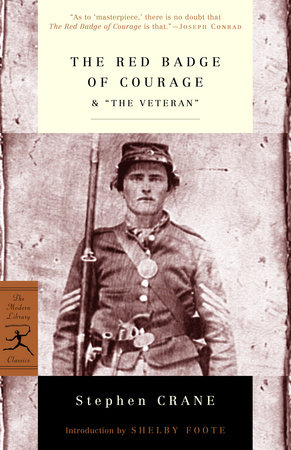The Red Badge of Courage & “The Veteran” Reader’s Guide
By Stephen Crane


1. The novel’s famous opening paragraph ends with these words: ". . – And at night, when the stream had become of a sorrowful blackness, one could see across it the red, eyelike gleam of hostile camp fires set in the low brows of distant hills." How does this sentence set the tone for the rest of the novel? Do you find echoes of this sentence in the subsequent pages?
2. In the first paragraph is Crane’s first usage of the word "red." What else in the book does he describe as red? Is his usage of the word sometimes surprising? How so? H. G. Wells refers to this as Crane’s "force of color." What do you think Wells means by this?
3. Why does the narrator always refer to the protagonist as "the youth." We only learn Henry’s name from his fellow soldiers; why does the author do this? How does this affect the story?
4. Henry’s first encounter with a corpse both startles and numbs him. Crane describes it this way, "[Henry] vaguely desired to walk around and around the body and stare; the impulse of the living to try to read in dead eyes the answer to the Question." What do you think the Question is? Why do you think Crane chose to capitalize this word?
5. In Chapter 3, the regiment’s preparation for battle is described: "During this halt many men in the regiment began erecting tiny hills in front of them. They used stones, sticks, earth, and anything they thought might turn a bullet. Some built comparatively large ones, while others seemed content with little ones." What does this say about the different way men prepare themselves for war? Who is noticing this difference, the narrator or Henry himself? Are they the same?
6. Chapter 4 ends with, "The youth achieved one little thought in the midst of this chaos. The composite monster which had caused the other troops to flee had not then appeared. He resolved to get a view of it, and then, he thought he might very likely run better than the best of them." What does this imply? What is the monster? Why is Henry capable, or believes he is capable, of seeing it when the others are not?
7. Joseph Conrad described Stephen Crane as a man "with an incomparable insight into primitive emotions, who, in order to give us an image of war, had looked profoundly into his own breast." Why is Crane’s rendering of war so moving? How does it successfully portray the horrors of war in a little over two hundred pages, when most war novels are epic in length and scope? Why do you think Crane chose to write his novel this way?
8. Why does Henry leave his regiment? Is it an act of courage or cowardice? How does Henry perceive it himself?
9. What ultimately is Henry’s red badge of courage? Is it his wound to the head, or is it something else?
Just for joining you’ll get personalized recommendations on your dashboard daily and features only for members.
Find Out More Join Now Sign In